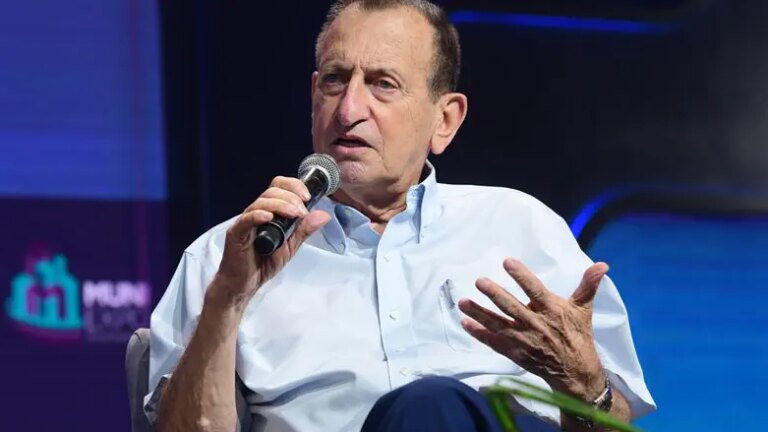In Tel Aviv, a city known for its electric beaches, innovation economy, and unapologetic secularism, Mayor Ron Huldai rules like a man born to sit atop a barricade waving the tricolor of the French Revolution. But unlike the Revolution’s noble slogans—Liberté, Égalité, Fraternité—Huldai’s rhetoric seems to forget the last word altogether when it comes to religious Israelis.
On a recent podcast with journalist Nadav Perry, Huldai didn’t just wade into the familiar waters of church-state separation—he cannonballed in. When asked whether religious belief is compatible with democracy, he didn’t blink. “If halacha becomes the law of the land—then we are Iran,” he warned, equating Jewish religious law with theocratic authoritarianism in one breathless leap across logic and history.
It was a revealing moment. Not just for what it said about Huldai’s views, but for what it ignored: namely, the rich tradition of religious leaders who have undergirded, not undermined, democratic ideals. Martin Luther King Jr., with his Southern Baptist cadence, led a peaceful revolution against America’s original sin of racism. William Wilberforce, animated by evangelical fervor, led the first successful campaign to abolish the slave trade. These were men of the cloth, not commissars. They preached not intolerance, but dignity—the very soul of democratic life.
The Irony of Illiberal Liberalism
To understand Huldai’s worldview is to recognize the dogmas of a different kind of fundamentalism: secular absolutism and its historic tendency to marginalize religious dissent. His is a worldview that regards religion not as a civic participant but as a civic threat—an interloper, an antique, something quaint and irrational best left in the museum of national memory. It’s the same spirit that animated the Jacobins of revolutionary France who, under Robespierre’s reign, demolished church spires and temple domes because they tended to be the tallest buildings in every locale and thus violated the revolutionary dogma of “equality”.
This is no hyperbole. Huldai’s own framing leaves little room for religious Israelis to participate fully in the democratic process without suspicion. In his logic, a religious Jew in the Knesset is either a ticking theocratic time bomb or a secret autocrat in a yarmulke. If one takes their values from Torah rather than Tel Aviv University’s sociology department, they’re not just wrong—they’re dangerous.
But this posture reveals a deeper failure to grasp the roots of democracy itself. The very concept of human rights, as understood in the West, is born not from pure secularism but from Judeo-Christian ethics. The belief that every person possesses inalienable dignity stems from the biblical idea that human beings are created in the image of God. Strip that idea of its source and democracy is left without a soul—just procedure without purpose.
A Left Adrift
Huldai, a proud veteran of Israel’s Labor Party and founder of the short-lived “Israelis Party,” positions himself as a guardian of democracy. But increasingly, his vision of democracy looks more like a one-party state of ideas—his own. It’s not just religion that gets marginalized, but dissent. His brand of secularism requires not neutrality but the purging of religious influence from public life entirely, ironically mirroring the very theocratic rigidity he claims to oppose.
This phenomenon isn’t isolated. Across the Western Left, there’s an ongoing crisis of coherence. In cities like New York, London, and Paris, progressive coalitions struggle to square their supposed commitments to free speech, women’s rights, and pluralism with the need to appease increasingly radical, often illiberal, blocs within their own camps. Antisemitism, once relegated to the fringe, is now tolerated under the guise of anti-Zionism. Dissent is labeled hate. And in cities like Tel Aviv, a mayor can publicly smear millions of believing citizens as anti-democratic with no hint of self-doubt.
The Real Test of Democracy
If democracy is truly about tolerance and representation, then it must do more than pay lip service and actually accommodate actual pluralism (an now unpopular word that has been replaced by “inclusion” and “diversity”) . Indeed, religious citizens should be accorded status as equals—not as second-class threats to be managed. The question is not whether rabbis influence the faithful—of course they do, just as academics, media figures, and yes, mayors like Huldai seek unfettered influence of the secular. The real question is whether religious Israelis are welcome participants in a democratic dialogue—or whether the conversation is over before it begins.
Ron Huldai’s vision of democracy, purged of piety and deeply skeptical of the devout, is not progress. It’s regression. And like all revolutions that devour their children, it risks turning the “enlightened” into tyrants straight out of a George Orwell novel.
In the end, the test of a healthy secular democracy is not how well it protects secularism—but how fairly it treats the faithful.




